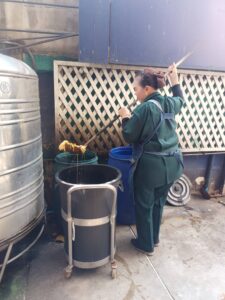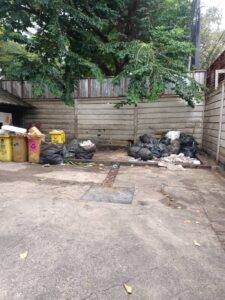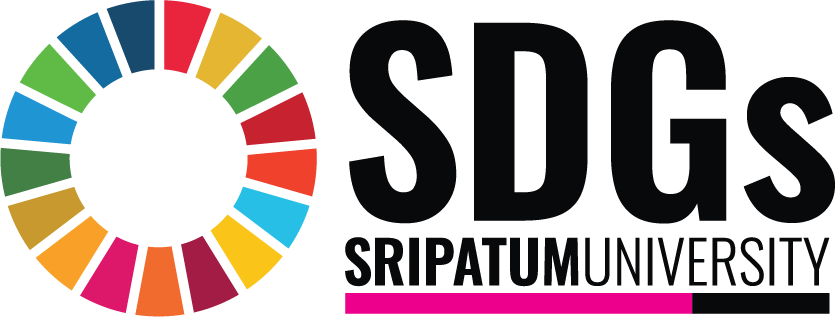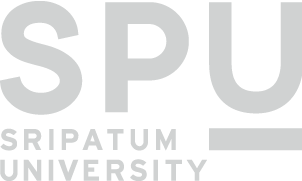

SPU Leads the Way in Safe Hazardous Waste Management
Sripatum University strengthens its commitment to health and environmental sustainability with a robust hazardous waste management policy aligned with global sustainability goals.
With the Office of Buildings and Facilities at the helm, Sripatum University (SPU) has implemented a comprehensive hazardous waste management system that ensures health and safety while supporting the UN Sustainable Development Goals. This initiative aligns primarily with SDG 12: Responsible Consumption and Production, particularly 12.2.3 — Hazardous waste disposal policy, ensuring the proper handling of chemical and toxic waste. The policy also resonates with SDG 3: Good Health and Well-being, especially in safeguarding the health of students, staff, and the surrounding community through hygienic waste disposal practices.
The university coordinates daily waste collection in collaboration with the Bangkok Metropolitan Administration and separates reusable and recyclable materials to minimize environmental risks. This proactive separation aligns with sub-goals 12.2.1 (Ethical sourcing policy) and 12.2.4 (Landfill and recycling reduction policy). The policy also touches on SDG 6: Clean Water and Sanitation by preventing toxic leakage that could contaminate water sources, supporting sub-goal 6.3.2 on pollution prevention in water systems.
Beyond operations, SPU plans to advance its sustainability impact through improved tracking systems, training programs for staff and students, and investment in green technologies — echoing SDG 9: Industry, Innovation and Infrastructure through sub-goal 9.3.1 (Spin-offs with sustainability innovations). These future-forward strategies also promote lifelong learning (SDG 4), workplace safety (SDG 8), and institutional transparency (SDG 16).
The university’s efforts embody SDG 11: Sustainable Cities and Communities and SDG 17: Partnerships for the Goals, through collaborations with local authorities and active community engagement in waste management.
Sripatum University demonstrates that even the unseen aspects of campus life — such as managing hazardous waste — can become powerful contributions to the global sustainability agenda. With dedicated policies and future plans for continual improvement, SPU affirms its role as a national leader in embedding the SDGs into every level of university operations.
ข่าวในภาษาไทย | News in Thai
ม.ศรีปทุม เดินหน้านโยบายจัดการขยะอันตรายอย่างปลอดภัยและยั่งยืน
มหาวิทยาลัยศรีปทุมตอกย้ำพันธกิจด้านสิ่งแวดล้อมและสุขภาพ ด้วยระบบจัดการขยะอันตรายที่เข้มแข็ง สอดคล้องเป้าหมายการพัฒนาที่ยั่งยืนของสหประชาชาติ
ภายใต้การดูแลของสำนักงานอาคารสถานที่ มหาวิทยาลัยศรีปทุม (SPU) ได้ดำเนินการจัดการขยะอันตรายอย่างเป็นระบบ โดยคำนึงถึงความปลอดภัยต่อสุขภาพและสิ่งแวดล้อม และเชื่อมโยงอย่างชัดเจนกับเป้าหมาย SDG 12: การบริโภคและการผลิตอย่างยั่งยืน โดยเฉพาะเป้าหมายย่อย 12.2.3 นโยบายการกำจัดขยะอันตราย เพื่อให้การกำจัดสารเคมีและวัสดุพิษเป็นไปอย่างถูกต้อง และยังสอดคล้องกับ SDG 3: สุขภาพและความเป็นอยู่ที่ดี โดยส่งเสริมการจัดการขยะที่ถูกสุขลักษณะเพื่อปกป้องสุขภาพของนักศึกษา บุคลากร และชุมชนโดยรอบ
มหาวิทยาลัยทำงานร่วมกับกรุงเทพมหานครในการจัดเก็บขยะรายวัน พร้อมมีระบบคัดแยกขยะที่สามารถนำกลับมาใช้ใหม่หรือนำไปกำจัดอย่างถูกวิธี ลดผลกระทบต่อสิ่งแวดล้อม สอดรับกับเป้าหมายย่อย 12.2.1 (นโยบายการจัดซื้ออย่างมีจริยธรรม) และ 12.2.4 (นโยบายลดการฝังกลบขยะและส่งเสริมการรีไซเคิล) อีกทั้งยังเชื่อมโยงกับ SDG 6: น้ำสะอาดและการสุขาภิบาล โดยป้องกันการรั่วไหลของสารพิษสู่แหล่งน้ำ สนับสนุนเป้าหมายย่อย 6.3.2 (การป้องกันมลพิษในระบบน้ำ)
SPU ยังมีแผนยกระดับการดำเนินงานในอนาคต เช่น การพัฒนาระบบติดตามปริมาณขยะอันตราย การจัดอบรมบุคลากรและนักศึกษา รวมถึงการลงทุนในเทคโนโลยีสีเขียว ซึ่งสะท้อนถึง SDG 9: อุตสาหกรรม นวัตกรรม และโครงสร้างพื้นฐาน ผ่านเป้าหมายย่อย 9.3.1 (สปินออฟด้านนวัตกรรมเพื่อความยั่งยืน) ทั้งยังเสริมสร้างการเรียนรู้ตลอดชีวิต (SDG 4), ความปลอดภัยในที่ทำงาน (SDG 8) และความโปร่งใสของสถาบัน (SDG 16)
นโยบายนี้ยังเชื่อมโยงกับ SDG 11: เมืองและชุมชนที่ยั่งยืน และ SDG 17: ความร่วมมือเพื่อการพัฒนาที่ยั่งยืน ผ่านการทำงานร่วมกับหน่วยงานภาครัฐและการมีส่วนร่วมของชุมชนในระบบจัดการขยะ
มหาวิทยาลัยศรีปทุมแสดงให้เห็นว่า แม้แต่เรื่องที่ไม่เป็นที่สังเกตอย่าง “การจัดการขยะอันตราย” ก็สามารถเป็นพลังขับเคลื่อนสู่เป้าหมายการพัฒนาที่ยั่งยืนของโลกได้อย่างแท้จริง ด้วยนโยบายที่ชัดเจนและแผนพัฒนาในอนาคต SPU ก้าวสู่การเป็นผู้นำระดับประเทศในการบูรณาการ SDGs เข้ากับทุกมิติของการบริหารมหาวิทยาลัย


